Radio host Steve Bailey explores the effects of eczema
- Published
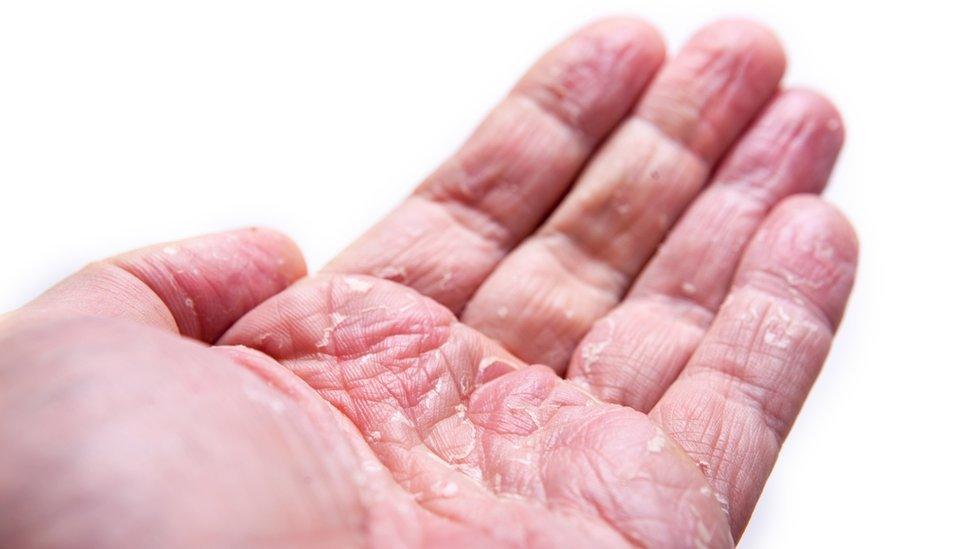
One in 12 adults in the UK and about 20% of children suffer from eczema
BBC presenter Steve Bailey has struggled with the mental and physical effects of eczema since he was young and has kept his condition hidden from all but his closest family and friends.
But after fearing he could lose his foot to the condition, he chose to delve deeper into its devastating effects by speaking to those who have shared his painful journey.
Eczema, also known as dermatitis, is a dry skin condition which, according to the National Eczema Society, affects one in 12 adults in the UK and about 20% of children.
Though a fairly common ailment, it is highly individual and the severity of the condition can vary wildly.
Professor Mike Cork, a consultant dermatologist at the University of Sheffield, describes it as "one of the most destructive diseases we have".
"The very mildest form of atopic eczema could be a tiny bit of dry skin on a baby's face and all you need is to avoid soap and detergents, [apply] some nice moisturisers and maybe a couple of days of steroids in a year - 85% of eczema is mild or moderate," he says.
"But, when we come to severe, things are so different: 100% of the skin surface can be affected, bright red, bleeding, infected. It can be hard to move, impossible to work, they can't have relationships, their life is totally destroyed."
Steve and Charly
"I feel like I want to rip my skin off and let the flesh underneath breathe"
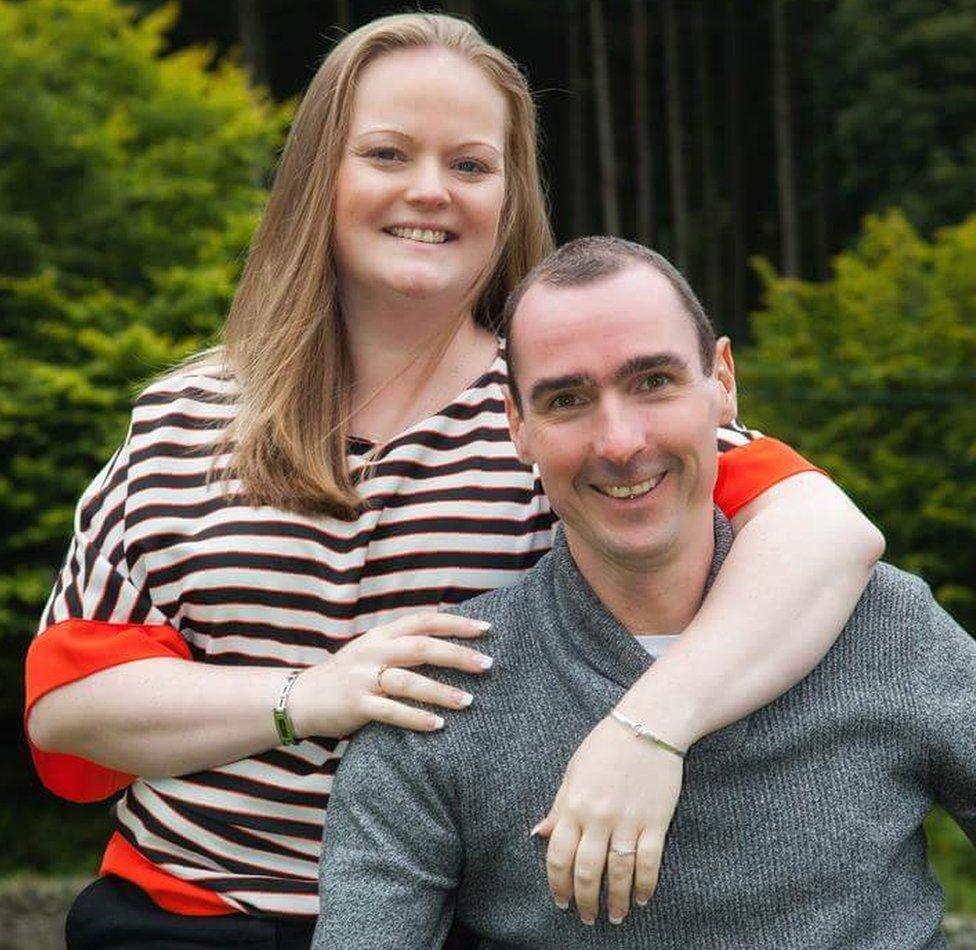
BBC Radio presenter Steve Bailey (right) has suffered with eczema since he was young
Steve, 40, from Bradford, has presented the BBC Yorkshire Early Show since 2013 and lectures in media and journalism at the University of Huddersfield.
But, though his career involves talking to people each and every day, he has never been able to talk openly about his eczema.
"I'd imagine 80% of the time it's ruling how I think I'm perceived by other people," he said.
"I'm either red, swollen, inflamed, or sore, and I feel like I have to make excuses for that. It's embarrassing.
"The itch can become so intense that I want to rip my skin off in order to let the flesh underneath breathe."
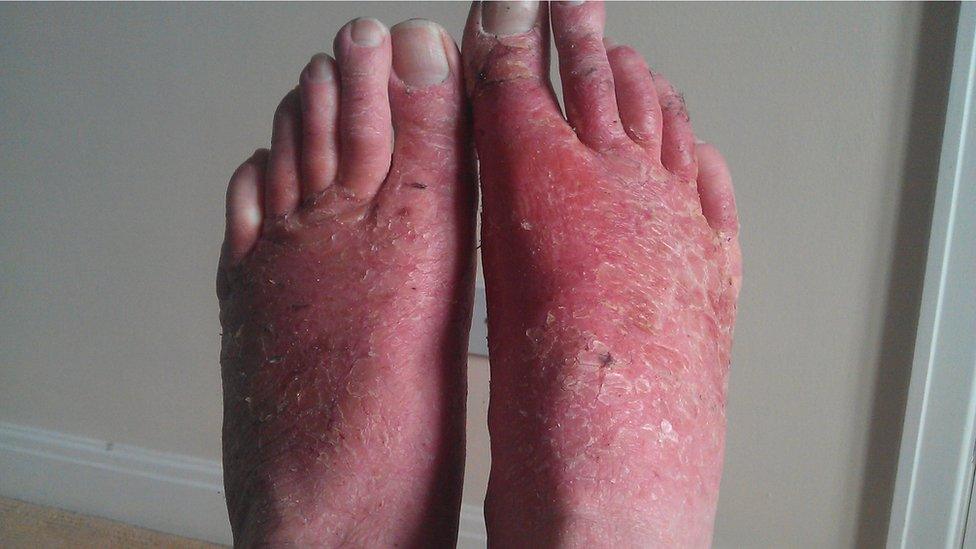
Steve feared he might lose one of his feet after they became badly infected
He said his suffering was taken to new level when his foot became infected in 2013.
"I think I made the excuse that I had dropped a wardrobe on my foot to cover up the fact the eczema was the real reason.
"It got to one point when I thought I was actually going to lose my foot.
"I was on antibiotic after antibiotic and eventually, thank God, it worked. Hopefully I'm never in that position again."
Steve's wife Charly said she thought the condition had actually brought them closer together, with her often having to help with treatments.
She said: "There's definitely no inhibitions in our relationship.
"As a girlfriend I was happy to help out and as a wife I'm just as happy to help out. I'd rather I be useful than you have to go to hospital every day and get somebody else to do it."
Jenny
"It's just this bone deep itch that you can never scratch"
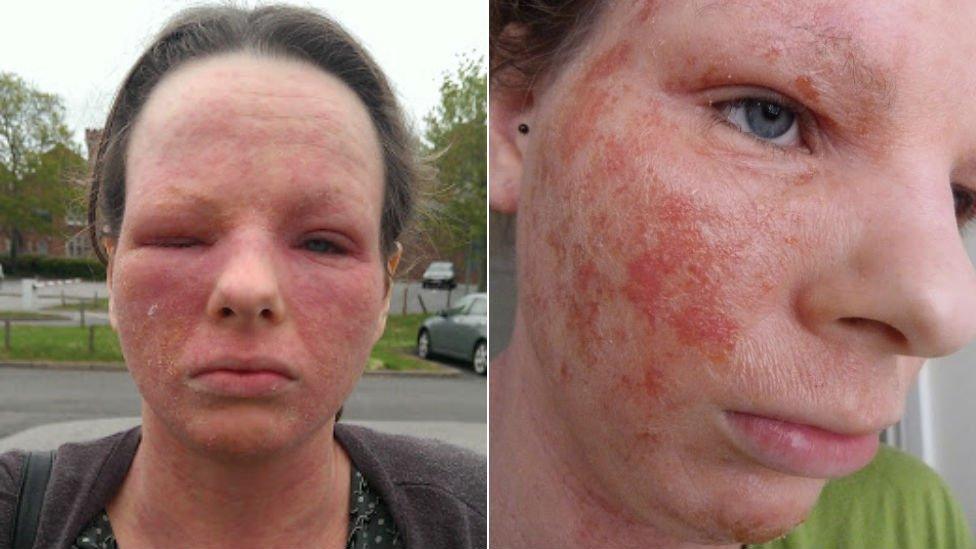
Jenny Stradling set up a blog in 2013 to discuss her condtion
Jenny Stradling, 26, from Leeds was born with eczema, but when she turned 16 her condition worsened and lead to her spending the night in A&E.
In 2013 she set up the blog I Have Eczema, external to share her experiences.
"It can be so bad that you actually stick to your bedding. You can have really raw areas and kind of look almost like a burns victim," she said.
But it is the urge to itch which Jenny, like many sufferers, struggles with particularly.
"It's just this bone-deep itch that you can never scratch," she said. "It never goes away."
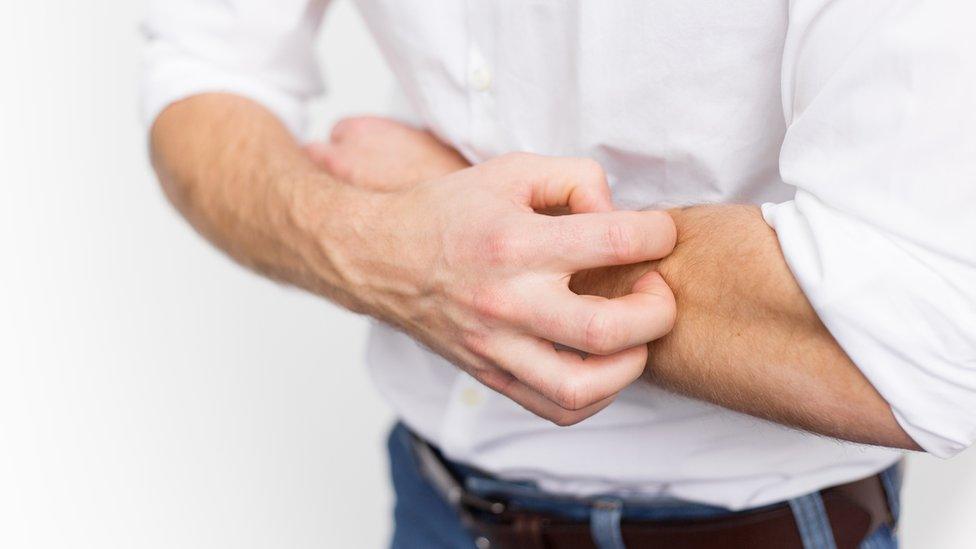
One of the biggest problems eczema sufferers face is the urge to scratch their itchy skin
Professor Andrew Wright, associate director of the Centre for Skin Sciences at the University of Bradford, said the "itch-scratch cycle" was a vicious circle.
"If you scratch the skin enough to produce some discomfort and some pain, that that will almost certainly override the lower grade sensation of itching," he said.
"[But] the scratching isn't helping, it is damaging the skin and, undoubtedly, leading to the development of more eczema."
Equally common is the impact the condition can have on sufferer's personal life.
Jenny said she had lost partners and friends as a result, and had been left housebound at times.
It has also affected her self-confidence and left her feeling so embarrassed by her constant scratching she would hide herself away for "secret skin-picking sessions".
"There's a kind of guilt that people put on you even though its not your fault. You can't help it. You just have to quench that itch," she said.
Alice and Sue
"I have to put that front up that everything is all right, so I go elsewhere and cry"

Alice and her mother Sue have been struggling with the effects of her eczema since she was born
It is not just those with eczema who shoulder the burden of the condition.
Sue's 17-year-old daughter Alice was born with eczema and she spent much of her childhood in hospital.
But, at home, Sue has also had to learn to live with her daughter's condition, at times having to change her bed sheets on a daily basis, buying wipe-clean furniture and replacing washing machines damaged by the creams and lotions that seep into her daughter's clothes.
Sue said: "It's very difficult as a mum. You have to be strong, you're a nag, you have to bully them in to doing their treatment. You have to cope with normal life, working and being a carer.
"I struggle but I get on with it. I have to put that front up that everything is all right, I can't cry here so I go elsewhere and cry."
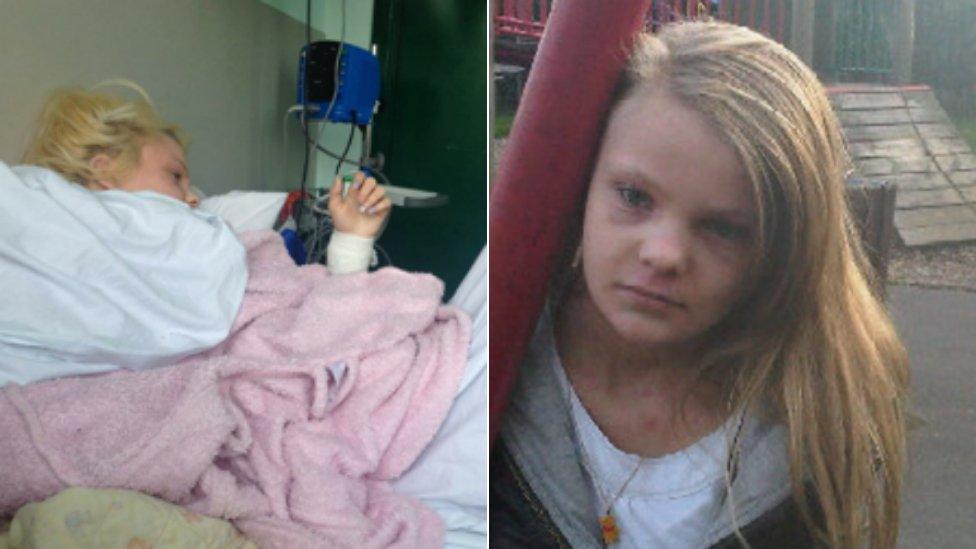
Alice spent months in hospital when she was younger as a result of her condition
The effects are both emotional and physical.
"When she's gone through what she's gone through all her life, I do want to protect her. I don't want to see my little girl in hospital.
"I don't sleep cause I hear Alice scratching. When she was young, she used to sleep with me so that I could hold her hands and stop her scratching so that she could get some sleep."
Their struggle was compounded when Alice was targeted by bullies, but, together, they have been able to move forward.
"My mum is my rock," said Alice. "If anything goes wrong, I just go to my mum. She is just my world. I could not have done anything I've done up to now without her."
Sam and Lindsay
"To see your own child literally ripping themselves to shreds is horrendous"

Lindsay Dobby gave up work to look after her son Sam
For 17-year-old Sam from Bradford, a combination of the desperate urge to scratch, the loss of control and comments about his skin left him feeling angry, upset and embarrassed.
"The whole of my body was itching and I've only got two hands, it was impossible to deal with," he said.
"I like being in control and that was the one thing I was not in control of, it made me frustrated and angry.
"I was probably quite ugly. I didn't like looking at my own skin because it was all dry and all red and all cracked.
"Little comments by people about how my skin looked, that made me feel worse about it.
"I was quite ashamed of my skin because it looked really horrible compared with everybody else's. I didn't want anybody to see it and think badly of me."
'You would do anything'
His mum, Lindsay Dobby, said that when Sam's condition worsened during his first year at secondary school, she was forced to give up work to look after him.
She said: "Daily life became really hard. I could not have gone to work and looked after Sam because he simply could not go to school.
"You end up shouting and snapping at each other because you're all tired."
She said her decision to give up work, however, was the only option.
"It's your child and you would literally do anything for them," she said.
"To see your child in that state literally ripping themselves to shreds, it's horrendous."
Eczema: More than Skin Deep will be broadcast on 29 August at 09:00 BST on BBC Radio Sheffield and on BBC Radio Leeds at 18:00 BST.